Description
Advanced Usul Study – Ijtihād & Taqlīd
A study on Ijtihad, Taqlid and associated topics that are discussed in the books of Islamic legal jurisprudence
This course is an opportunity to be part of a deep and comprehensive study of a key yet often neglected topic area in Usul ‘l-Fiqh.
Usul comprises of four main subject areas:
1. The sources of Islamic law (Adillah)
2. The meanings derived from words within the sources (Dalalat ‘l-Alfaz)
3. Dialectics, i.e. reasoned argumentation to prove or disprove a legal position (Jadal)
4. The independent and non-independent mechanisms for arriving at, issuing edicts in, and practising upon, legal opinions (Ijtihad, Taqlid, Talfiq, Ifta, Istifta, etc.)
This course focuses on the lattermost aspect of Usul.
Requisites:
– Fluency in reading Arabic – mandatory
– Basic comprehension of Fiqh from any Muslim school of law – mandatory
– Fluency in Urdu – desirable
Who Is this For?
Students with full reading comprehension in the Arabic language and who have studied the basics in the sciences of Shari’ah, especially Fiqh and Usul. For those who do not have a background in the study of Fiqh or Usul, the Introductory Course on the same topic will be more suited for them.
Lectures are delivered in English, but there are Arabic readings within the sessions.
Your Instructor
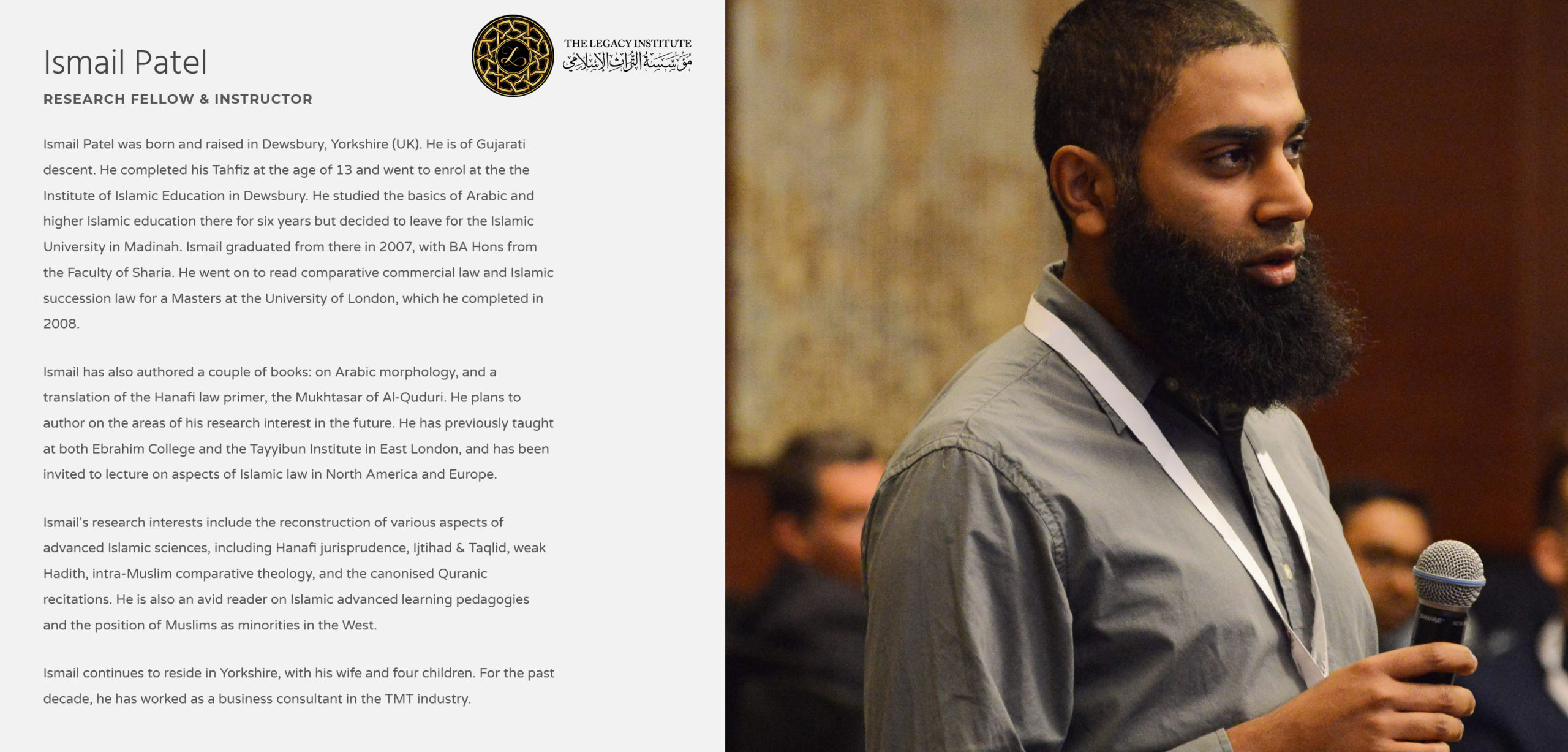
Course Objectives
In this course, participating students will acquire the following:
Session 1 – Introduction, Definitions and Nomenclature
Session 2 – Overview of the Prophet ﷺ and Companions’ era
Session 3 – Formats, Arenas & Fragmentation of Ijtihad
Session 4 – Madhhab-based Jurisdiction in an Islamic state
Session 5 – Manat, Legal Precedence and Jurist Rankings
Session 6 – Ijtihad Requisites and Shapers, Fiqh v. Hadith
Session 7 – “My Position is Authentic Hadith”: An Analysis
Session 8 – Further Readings From the Texts on Ijtihad
Session 9 – Further Readings From the Texts on Ijtihad
Session 10 – Further Readings From the Texts on Ijtihad
Session 11 – Taqlid: Sources, Drivers, Madhhab Selection
Session 12 – Adherence to a School in All its Rulings, 1/2
Session 13 – Non-Adherence to a School: Prerequisites
Session 14 – Adherence to a School in All its Rulings, 2/2
Session 15 – Investigating: Adhering to Muʿtamad Necessary?
Session 16 – A Problem: Ifta and Later Jurists’ Authority
Session 17 – Post-Action Taqlid and Retreating From Taqlid
Session 18 – Tatabbu’ ‘l-Rukhas: Yea or Nay?
Session 19 – Referring Laymen to Muftis Outside the School
Session 20a – Valid Versus Invalid Opinions
Session 20b – Talfiq: Levels, Status, Evidences, Examples
Content Breakdown:
- Definitions and nomenclature: Ijtihad, Taqlid, Ittiba, Mujtahid, Muqallid, Faqih, Rukhsa, Khilaf, Tarjih, Talfiq, Tamadhhub, Iltizam
- Historical overview of Ijtihad and Taqlid:
- he Prophet’s era
- The Companions’ era (10-50 AH)
- The era of the Madhhab Imams (50-400 AH)
- From 400 AH to 1200 AH
- Present day
- Form factors of Ijtihad
- Istinbat
- Tarjih
- Tafri`
- Intisar
- Fragmentation of Ijtihad
- The role of Maqasid in Ijtihad
- The rankings of Mujtahid scholars: Analysis, criticisms and impact
- Arenas of Ijtihad and Taqlid
- Jurisconsult level (ifta)
- State (siyasa) and judiciary (qada) levels
- Individual level
- Prerequisites of Ijtihad – who is able to exercise it?
- Fiqh v Hadith and the interplay between the two
- Is there a level between scholar and layman?
- Analysis of the work written by Muhammad Awwamah on the topic
- Scholarly works written on Ijtihad
- Readings from texts on Ijtihad, such as those by Abu Shamah, Ibn ‘l-Qayyim, al-Dihlawi et al
- Talfiq in Ijtihad
- Ijtihad that leads to an opinion outside the mainstream of the Four Schools, or a view of a Sahabi or scholar outside the Four Schools
- Taqlid discussions:
- 400 AH to present day: Overview
- Is Taqlid banned, allowed or mandatory? Comparing scholarly statements and deciphering their intentions
- Taqlid/Tarjih of a qawl of the Sahaba/Tabi`un outside of the 4 madhab
- The issue of adherence to a school
- For, and the arguments behind it
- Against, and the arguments behind it
- Does the layman have a madhhab of his own?
- Following Rukhsa v Following desire
- Checks and balances against following desire
- Analysis of positions in Taqlid by Madhhab
- Analysis of positions in Taqlid by geography
- Reading books on the genre of *the best madhhab* – do they have a role? Should they have ever been written? Analysis the books of Sibt Ibn ‘l-Jawzi, al-Babarti, Qadi `Iyad, al-Juwayni, Ibn Rajab in this topic
- Readings from texts earlier texts of Taqlid:
- Ahmad bin Hanbal
- Al-Jassas
- Ibn Hazm (and al-Albani)
- Al-Ghazzali
- Al-Sha’rani
- Al-Qarafi
- Ibn ‘l-Qayyim
- Ibn Rajab
- Al-Shatibi
- Ibn ‘l-Humam
- Ibn Hajar al-Haytami
- Al-Samhudi
- Al-Dihlawi
- Al-Bani
- Al-Buti
- Supporters of adherence to a school for a muqallid: Al-Maziri, Hanafi Transoxiana, Laknawi, Gangohi etc.
- Impact of polemics on discourses in Ijtihad and Taqlid
- Talfiq in Taqlid
- Taqlid of an opinion outside the mainstream of the Four Schools, or a view of a Sahabi or scholar outside the Four Schools
- Ifta and Istifta
- Historical overview
- Difference between Ijtihad and Ifta, and between Istifta and Taqlid
- Ifta for the non-Mujtahid: Employing Maqasid, Urf, preventative measures, Malsaha
- The issue of valid v. invalid opinions and differences: parameters and contributing factors to validity and invalidity
References:
Abbasah, Mura’at ‘l-Khilaf
Abu Ghuddah, Tarajim Sittah
Abu Shamah, Mukhtasar ‘l-Mu’ammal
Abu Ya’la, al-Ahkam al-Sultaniyyah
Al-Ala’i, al-Fatawa
Al-Awni, Ikhtilaf ‘l-Muftin
Al-Babarti, al-Nukat al-Zarifah
Al-Bani, Umdat ‘l-Tahqiq
Al-Fullani, Iqaz Himam Uli ‘l-Absar
Al-Haytami, al-Fatawa al-Fiqhiyyah al-Kubra
Al-Juwayni, Mughith ‘l-Khalq
Al-Kalwadhani, al-Tamhid
Al-Kawthari, Ihqaq ‘l-Haqq, Husn ‘l-Taqadi
Al-Mawardi, al-Ahkam al-Sultaniyyah
Al-Nabulsi, al-Jawab al-Sharif
Al-Naqib, al-Madhhab al-Hanafi
Al-Naza’ir, Bakr Abu Zayd
Al-Samhudi, al-Iqd al-Farid
Al-Shatibi, al-Muwafaqat
Al-Suyuti, Jazil ‘l-Mawahib, Irshad ‘l-Muhtadin, al-Radd Ala Man Akhlad Ila al-Ard, Taqrir ‘l-Istinad
Al-Tufi, Sharh Mukhtsar ‘l-Rawdah
Al-Wansharisi, al-Mi’yar al-Mu’rib
Al-Zarkashi, al-Bahr al-Muhit
Al-Zuhayli, Usul ‘l-Fiqh al-Islami
Awwamah, Athar ‘l-Hadith al-Sharif
Ba-Husayn, Kitab ‘l-Takhrij
Faridah Zuru, Min al-Ijtihad al-Tatbiqi Ila al-Ijtihad al-Maqasidi
Ghulam Mustafa al-Sindi, Sharh Mukhtasar ‘l-Quduri
Ibn Abi ‘l-Dam, Adab ‘l-Qada
Ibn Abi ‘l-Izz, al-Ittiba
Ibn Badran, al-Uqud al-Yaqutiyyah
Ibn Qayyim ‘l-Jawziyyah, I’lam ‘l-Muwaqqi’in
Ibn Rajab, al-Radd Ala Man Ittaba’ Ghayr ‘l-Madhahib al-Arba’ah, al-Istikhraj
Muhammad al-Farfur, al-Wajiz
Muhammad Hayat al-Sindi, Ghayat ‘l-Tahqiq
Mustafa al-Zarqa, al-Ijtihad Wa-Dawr ‘l-Fiqh Fi Hall ‘l-Mushkilat
Qadi Iyad, Tartib ‘l-Madarik
Shah Waliyyullah, Hujjat ‘llah al-Balighah
Sibt Ibn ‘l-Jawzi, al-Intisar
Taqi Usmani, Usul ‘l-Ifta
This is an On-Demand course where you can download video of the sessions at your convenience. It is not a live course. There is a group to ask questions and interact with the instructor.
Stay updated on social media – @thelegacyi
Questions or Inquiries, please email: admin@legacy.institute
*This course is not refundable.



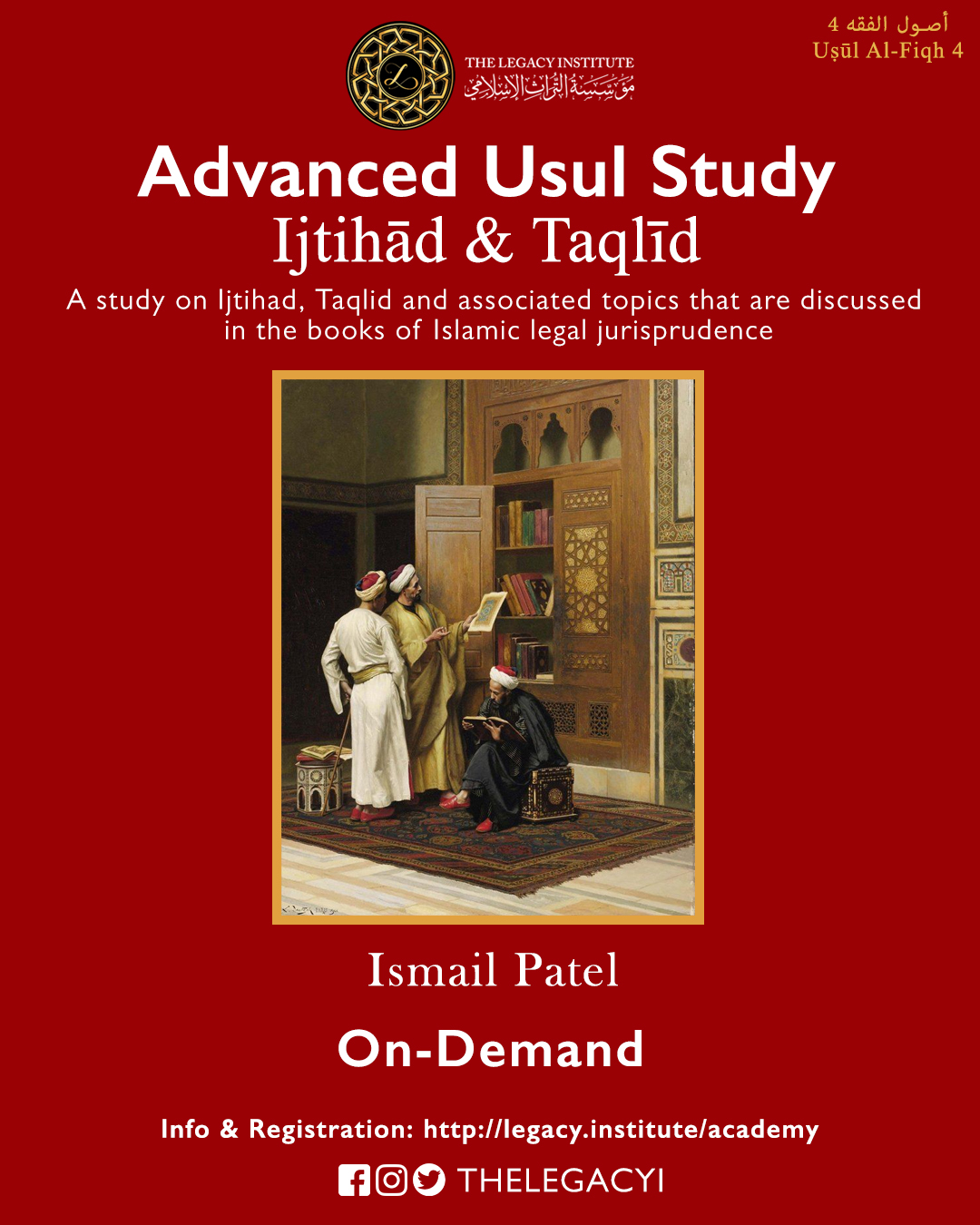
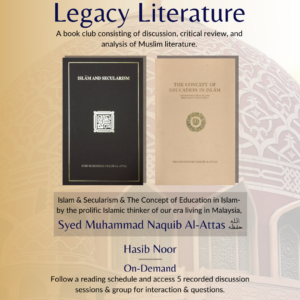
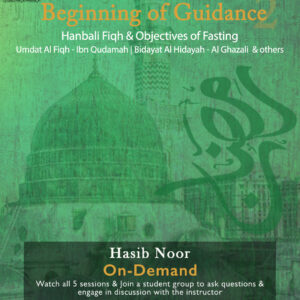

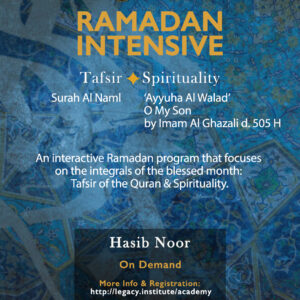
Harris K, UK –
“Having attended a 10 hour online basic taqleed course elsewhere, I enrolled on this course with Legacy Institute (delivered by Ustad Ismail Patel) thinking it to be the polar opposite of what I just studied, i.e. one group says taqleed shakhsi is wajib and the other says it is not. I was hugely disappointed with the previous course I attended as I didn’t really learn anything. I was blown away by the knowledge, course notes and lessons that were delivered by Ustad Ismail. He is down to earth and open to discussion and questions. He doesn’t force his opinions on anyone. For everything he presented to us in the lessons, he gave the verdicts and opinions of those on both sides. It was much much more than I ever expected. We covered so much in such little time. This for me was not a basic course, rather it was a super advanced course. We discussed everything from terms, madhabs, formation of madhabs, what is taqleed, ijtihad, following desires etc etc. Overall a brilliant course. Worth every penny. Hopefully, the ustad shall conduct a course on hanafi usool fiqh in the future.”
– Harris K, UK
A, USA –
“I saw the poster about this course and was immediately drawn to it because of the topic. This is a topic and a section of usul al-fiqh that is almost never taught in most traditional (deobandi) madaris. Shaykh Ismail did a phenomenal job explaining what ijtihad and taqlid mean and all their necessary components.”
– A, USA
Shahin ul Rahman, UK –
“A proficient scholar and legal theorist, Shaykh Ismail Ibrahim took us on a comprehensive journey through the historical development of usul al-fiqh and its influence on Muslim attitudes to ijtihad and taqlid. A must for every serious student of fiqh and usul.”
– Shahin ul Rahman, UK
Adeeb Shums –
“Taking this course opened up a lot of discussions that never crossed in my mind. Having seen Sh. Ismail’s command of Arabic and Islamic sciences over the years, I was truly delighted taking a course taught by Sh Ismail. Throughout the course one could tell how many years he has dedicated on this topic yet it seemed like we barely hit the surface and depth! I would recommend any serious student of knowledge with an independent and responsible mind to take Shaykh’s courses and deepen their knowledge and understanding. He is very accessible and will make time to to address your questions.”
– Adeeb Shums
Hamzah Hassan –
“The Advanced Usul Study – Ijtihād and Taqlīd” course taught by Shaykh Ismail Ibrahim at The Legacy Institute is a must for any serious student wishing to engage in the field of Jurisprudence at a scholarly level. A notable advantage of taking this course is that the Shaykh has dedicated himself to this topic for a number of years, and it really shows in the delivery of the course. Each lesson is replete with excerpts and quotes brought in full from a wide range of scholars, which reflects the Shaykh’s extensive research on this topic. The course is meticulously structured with extensive handouts provided for every session. Any queries about the content were quickly and comprehensively answered, and a wealth of external resources were provided for anybody wishing to investigate deeper. I can highly recommend this course.”
– Hamzah Hassan
Bilal Ismail – Al Kauthar Institute |Imam Development Program –
“Allah bless Sh Ismail for putting this course together. This course is the result of years of study into this topic. It’s dense, it’s intense, the references are many & the topic is vast. This course is a must for students wanting to appreciate the depth of this topic. I personally benefitted from the course Alhamdulillah.”
– Bilal Ismail – Al Kauthar Institute |Imam Development Program